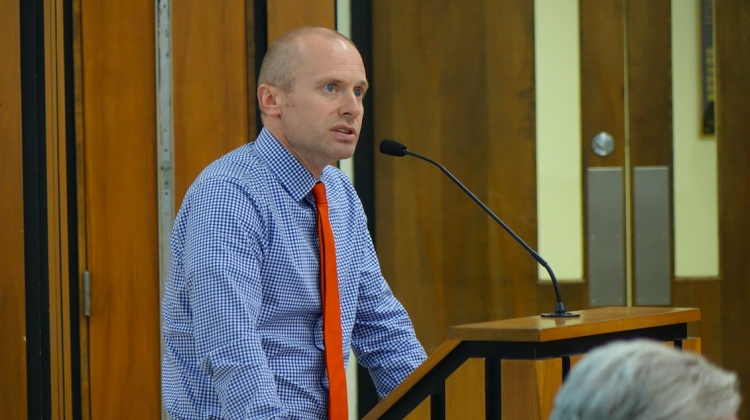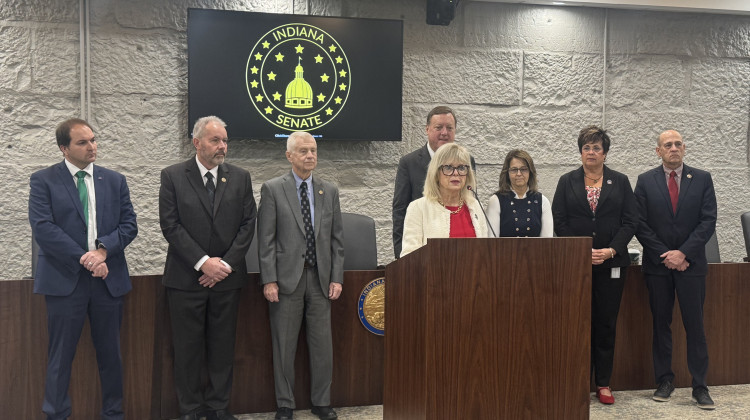
Indy Chamber President and CEO Michael Huber speaks to the Indianapolis Public Schools Board on Thursday, June 28, 2018.
Eric Weddle/WFYI NewsIndy Chamber wants Indianapolis Public Schools to make "significant changes" to reduce spending on facilities, transportation, and other areas, according to a document released Thursday.
Cost cutting as directed by the Chamber would not just create more efficiency and redirect funds to the classroom but lead to a financial surplus in the next eight years, the organization says. Currently, the district faces a $45 million budget deficit for the upcoming school year.
During an IPS Board meeting Thursday, Chamber CEO Michael Huber and consultant Michael Brink gave a brief preview of the efficiency plan the group is writing for the district and expects to release in coming weeks.
No details other than general ideas were discussed Thursday but Brink, an attorney at Faegre Baker Daniels, says some cost-cutting recommendations will be tough.
“But we think they present a great roadmap or blueprint for IPS to go forward, to ensure the taxpayers that money is being spent in the most efficient way possible," Brink says.
Huber says the Chamber will help find private funds for new staff or other initiatives to ensure the "transformative functions that will be identified" take place.
IPS should spend its limited funds on educational outcomes, the area where they have the most significant positive impact, and should "substantially increase" pay for teachers and staff.
"We definitely believe it is all about teachers and principals when it comes to school performance," he says."
IPS Superintendent Lewis Ferebee says he appreciates the work of the Chamber but that all recommendations may not be feasible.
"We are grateful to have the experience to give us that additional layer of analysis," he says. "Also it shows our willingness to be transparent and open our books to external partners to give us advice."
The Chamber began conducting an operational and financial review of the school corporation in March after district leaders failed to build community support for a nearly $1 billion property tax increase. The referenda, previously planned to for the May primary ballot is postponed to the Nov. 6 general election.
The total amount of tax increase is not yet known. The capital referendum, focused mostly on new safety measures and building improvements, is set for $52 million, a decrease of $148 million from the original request.
On July 17 the district will hold a public hearing for the operating referendum. Initially, the district sought $736 million, or $92 million per year for eight years, before canceling the request. In March, district leaders said they would instead seek $528 million, or $66 million per year. But it now seems that the district will propose a different amount in July.
The Chamber conducted more than 50 interviews, including with IPS senior executives, operational leads, teachers and others, as part of writing the recommendations.
Here are some general findings from the Chamber's preview:
- 47 percent of district budget goes to education and teacher pay.
- IPS spends $15,248 per student -- the most among any public school district in the Indianapolis metro area during 2016-17.
- IPS spends about 10 percent of its total budget on transportation and spends more each year than the amount of money it receives from property taxes to fund transportation.
- IPS spends about 13 percent of its total budget on facilities and capital.
 DONATE
DONATE









 Support WFYI. We can't do it without you.
Support WFYI. We can't do it without you.